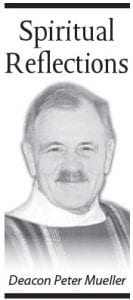Two weekends ago, while helping to remove the Christmas decorations from the church, I was asked “Who is going to do this next year?”
Wondering what the question meant, I sought clarification. “Well, look around we are all old…there are no young people here.”
“Who is going to know what to do?”
The question made me wonder: is religion dead? Is the rise of secularism throughout the western world causing the death of religion? The number of people who don’t identify with a religion has risen and shows no sign of abating.
I have read that the former Archbishop of Canterbury, George Carey, issued a dire warning that Christianity was a “generation away from extinction” in Britain unless churches make drastic changes and bring young people back into the fold.
How do the undecided or unpracticing return to religion? Some have said there are a lot of people out there saying they’re open to greater involvement in religion. But there is a big asterisk. They’re saying they are open to greater involvement if they find it to be worthwhile. So what is worthwhile?
When looking at social media sites, such as Facebook, many young people identify with the family’s religion but are not attending church.
Perhaps young people are turning their backs on religion because parents forced them to attend church as children and there’s less cultural stigma against the non-religious. Also, maybe young people have found religion’s exclusive nature distasteful. Many of them talk about feeling free from the religious structures, the religious rules, the things that kind of tie you down. The rise of secularism is noticeable.
For many generations it was assumed that the people who would populate our churches would be our children and our grandchildren. We know that’s no longer going to be the case. We know that our children attend church at a far lesser rate and our grandchildren will attend even less.
I think among young people there is a new interest in spirituality. No matter how many toys and playthings you have . . . there’s a restlessness for something more and deeper, and I think there’s a bit of a turn to religion to try and develop a spirituality.
The challenge is for churches to connect with people who choose to go to church rather than grow up within a church.
Society and secularism are often blamed for diminishing church attendance, but I think that the influence within the home can be more powerful than forces at church, school or in society at large. Parents modeling how to practice their faith by attending and serving in the church is important, but that influence can be blunted if either parent doesn’t have a close relationship with their children. Parental piety doesn’t make up for a distant dad. In other words, fathers who lack warmth, affirmation and unconditional love for their children, who may question or leave religion as a young adult, are less likely to see those children return and carry on the family’s faith tradition.
Mothers are typically the keepers of the family faith and known to take the children to church more often than the father. Having both parents engaged in the same faith would increase the odds of their children doing the same.
Parents can be incredibly influential in their teens’ lives so churches need to harness that, and work with the parents rather than in opposition. Young adults who reject the religion of their parents and then come back are those who likely had a close relationship with their parents, saw them consistently living their faith and had the freedom to find their own religious identity. The values of the sacred and the profane are what we pick up from our parents in the home. The primary focus of influence of religion and spirituality is in the family.
Perhaps families should demand that the churches return to a family focused community rather than be segregated by age. In other words Sunday school or religious education classes based on age, or liturgies based on age segregate the community.
You have your Sunday school classes by grade level, you have your youth group, you have your young adult group, you have the older ladies who come and quilt in the morning. Those segregated environments can create a culture, particularly in youth ministries, that makes parents antagonists rather than partners in the process of religiously socializing teens and young adults.
Parents who are able to pass on their religious traditions through weekly family home evenings, where they pray and discuss their beliefs, will build religious identity and practice. Family group evenings will integrate the influential role of families and home life into their beliefs and practices.
Just maybe we should be asking our church leaders to look at the structure of religious education and community, integrating all ages into our religious education. The question of “who is next” will be easier to answer.
Each month a member of the Cook County Ministerium will offer Spiritual Reflections. This month our contributor is Deacon Peter Mueller of St. John’s Catholic Church in Grand Marais.



Loading Comments